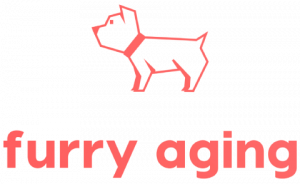There are several reasons why a senior dog may experience hair loss. Some possible causes include hormonal imbalances, allergies, skin infections, parasites, or nutritional deficiencies.
Let’s review each of these factors and how to properly care for your dog’s coat.
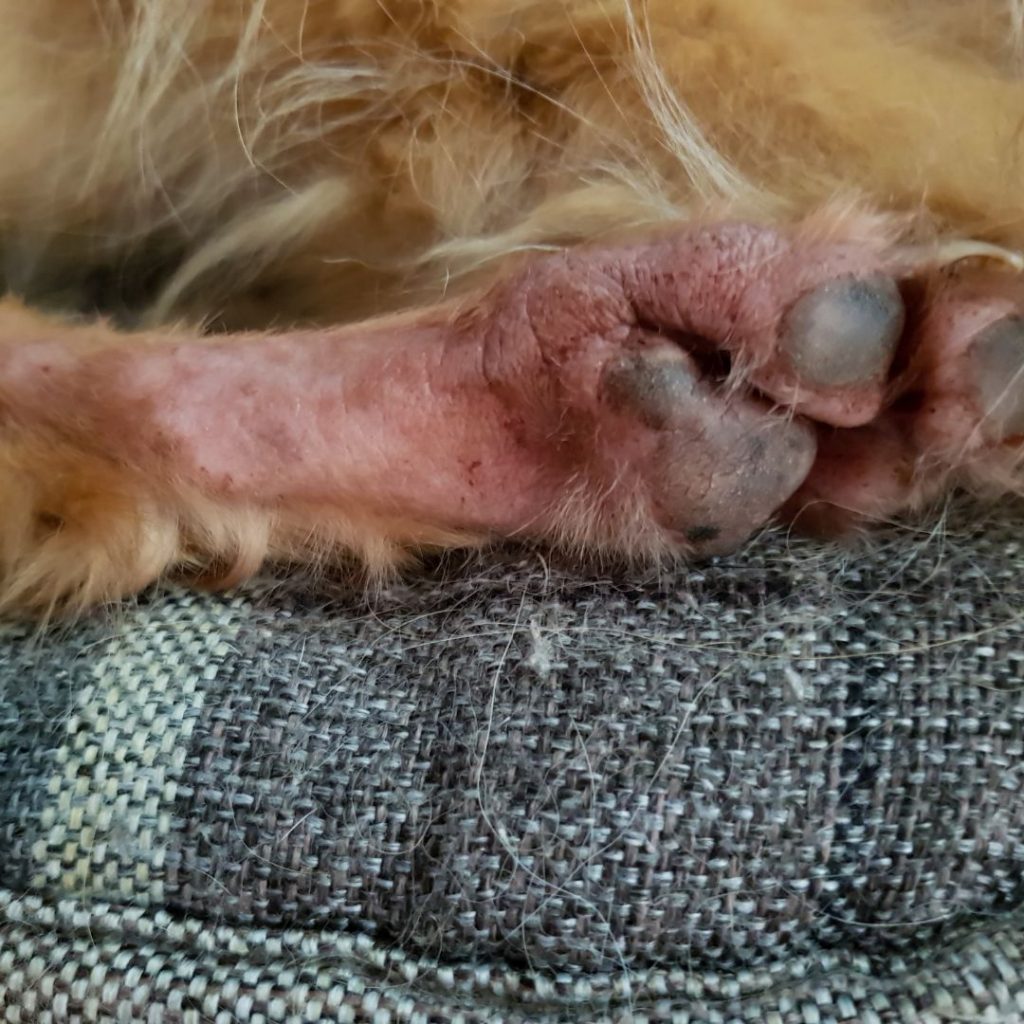
Normal Dog Hair Growth and Loss
Hair shedding is a natural process in which old or damaged hair falls out to make room for new hair growth. It is a normal part of the hair growth cycle and typically occurs evenly throughout your pup’s body.
Hair loss, on the other hand, refers to excessive or abnormal hair shedding that can result in thinning or bald patches. It is important to distinguish between the two to determine if there may be an underlying issue causing the hair loss.
Some signs that may indicate hair loss rather than normal shedding include:
- A significant increase in the amount of hair being shed.
- Patchy or uneven hair loss.
- Changes in hair texture.
- Skin irritation or redness.
- Thinning of the hair.
Temporary hair loss can also happen due to seasonal shedding, during pregnancy, lactation, or after your dog is recovering from an illness or fever.
Common Causes of Hair Loss in Senior Dogs
Cushing’s Disease
Cushing’s disease, also known as hyperadrenocorticism, is a condition where the adrenal glands produce an excessive amount of steroid hormones. The excess steroids can disrupt the normal hair growth cycle, leading to hair thinning or loss. The hair loss is typically symmetrical and can occur on the body, tail, and even the head. The skin may also become thin and easily bruised.
Cushing’s disease can be caused by either a tumor in the pituitary gland (located in the brain) or the adrenal glands (located near the kidneys). The pituitary-dependent form is more common and usually affects small to medium-sized dogs, while the adrenal-dependent form typically affects larger dogs.
Other symptoms of Cushing’s disease may include increased thirst and urination, increased appetite, pot-bellied appearance, muscle weakness, and panting.
Treatment
Treatment options for Cushing’s disease may include medication to control the excess hormone production, surgery to remove tumors or radiation therapy. These treatments can help manage the symptoms, including hair loss, and improve the overall quality of life for the affected dog.
Hypothyroidism
Hypothyroidism is a condition in which the thyroid gland does not produce enough thyroid hormone. When there is a deficiency of thyroid hormone, it can disrupt the hair growth cycle and lead to hair loss. In cases of hypothyroidism, it usually occurs all over the body rather than in specific areas.
In addition to hair loss, other symptoms of hypothyroidism in pets may include weight gain, lethargy, intolerance to cold, dry skin, and changes in behavior.
Treatment
Your vet will perform blood tests to measure the levels of thyroid hormone and diagnose the condition. The treatment typically involves the administration of synthetic thyroid hormone medication to replace the deficient hormone. With proper treatment, the symptoms of hypothyroidism, including hair loss, can be managed and reversed. However, hair regrowth may take some time.
Allergies
Allergies can indeed cause hair loss in pets. When a pet is allergic to certain substances, such as certain foods, environmental allergens like pollen or dust mites, or flea saliva, their immune system overreacts and produces an inflammatory response. This inflammation can lead to itching, which can result in excessive scratching, licking, and chewing of the skin. Over time, this excessive self-grooming can lead to hair loss.
There are different types of allergies that can affect pets. The most common are flea allergies, food allergies, and environmental allergies (atopic dermatitis). Let’s see each of them:
- In flea allergies, the pet is allergic to the saliva of fleas and even a single flea bite can cause intense itching and hair loss.
- Food allergies occur when a pet’s immune system reacts to a particular ingredient in their diet.
- Environmental allergies, also known as atopic dermatitis, occur when a pet is allergic to substances in their environment, such as pollen, mold, or dust mites.
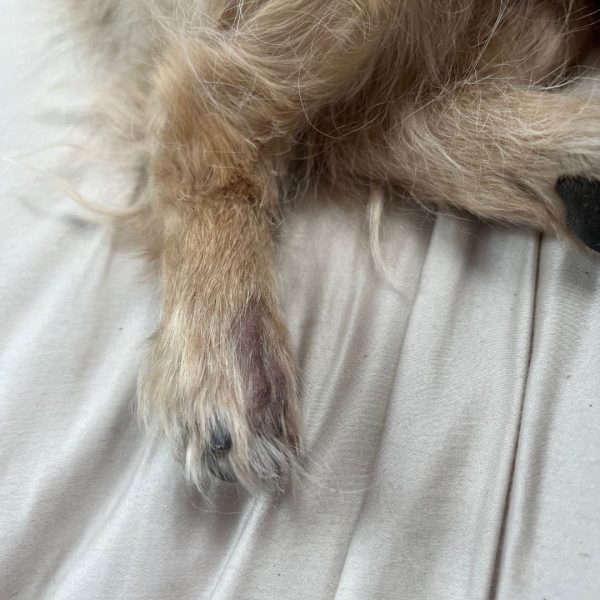
Treatment
Diagnostic may involve conducting allergy testing, which can help identify the specific allergens causing a pet’s reaction. Treatment options may include allergy medications, special diets, flea prevention, and allergen avoidance. In severe cases, a veterinarian may recommend immunotherapy, which involves regular allergy shots to desensitize the pet’s immune system to the allergens.
Skin infections
When the skin becomes infected, it can lead to inflammation and irritation, resulting in hair loss in the affected area. There are several types of skin infections that can cause hair loss in dogs:
- Bacterial infections, such as staphylococcal or streptococcal infections, can cause redness, swelling, and hair loss in the affected area.
- Fungal infections, such as ringworm, can also cause hair loss, along with scaly patches and itching.
- Parasitic infections, such as mange or fleas, can lead to hair loss as the parasites feed on the skin and hair follicles.
In addition to hair loss, skin infections can cause other symptoms such as itching, redness, inflammation, and a bad odor. The severity of hair loss will depend on the type and extent of the infection.
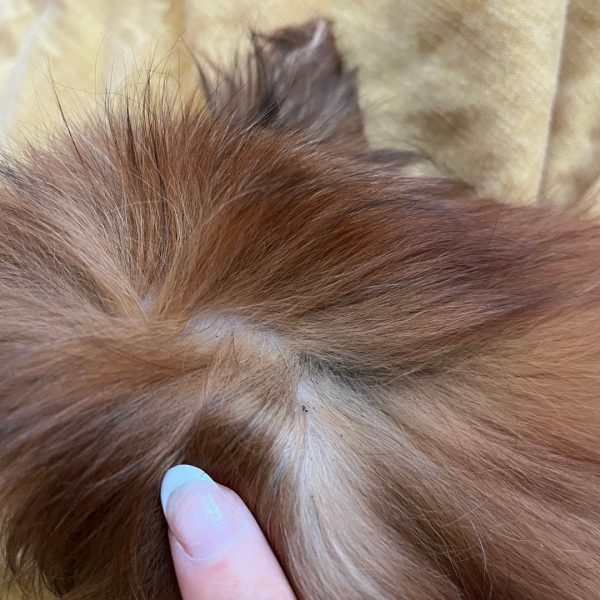
Treatment
Treatment for skin infections and hair loss will depend on the underlying cause. Bacterial infections are often treated with antibiotics, while fungal infections are treated with antifungal medications. Parasitic infections may require the use of topical or oral medications to eliminate the parasites. In some cases, treating the underlying infection will lead to hair regrowth once the infection has cleared but it takes time.
Nutritional Deficiencies
One common nutritional deficiency in senior dogs is a lack of essential fatty acids, such as omega-3 and omega-6 fatty acids. These nutrients are important for maintaining healthy skin and coat. When dogs do not receive enough of these fatty acids in their diet, it can lead to dry, itchy skin and hair loss.
Another nutritional deficiency that can contribute to hair loss in senior dogs is a deficiency in certain vitamins and minerals, such as vitamin E, zinc, and biotin. These nutrients are necessary for proper hair growth and maintenance. Without an adequate supply, dogs may experience brittle hair that easily breaks or falls out.
Protein is also essential and plays a crucial role in the growth, maintenance, and repair of tissues, including the hair. One of the common signs of protein deficiency in dogs is hair loss or poor hair quality. This is because protein is necessary for the production of keratin, which is the main component of hair. When dogs do not receive enough protein, their hair may become brittle, thin, and prone to breakage. In severe cases, hair loss may occur. Protein deficiency can also weaken the immune system, making senior dogs more susceptible to infections and other health issues. Additionally, protein deficiency can lead to muscle wasting and weakness, further impacting the overall health and mobility of senior dogs.
Treatment
Senior dogs need to receive a balanced and nutrient-rich diet to help maintain the health of their skin and coat. Providing high-quality commercial dog food that is specifically formulated for senior dogs can help ensure they are receiving the necessary nutrients to support healthy hair growth. Additionally, adding supplements or incorporating foods rich in omega-3 fatty acids, such as fish oil or flaxseed, can also be beneficial for promoting a healthy coat.
Pressure Sores
Pressure sores, also known as decubitus ulcers or bedsores, can occur in senior dogs who are immobile or have difficulty moving due to age-related conditions such as arthritis or paralysis. These sores develop when there is prolonged pressure on a particular area of the body, typically over bony prominences like the hips, elbows, or hocks. The constant pressure over time makes the skin thicker, the hair falls out and calluses appear. If you leave it unattended, the skin will crack, bleed, and get infected.
Treatment
Prevention will always be the best. Try to:
- Provide a soft and supportive bed that is large enough for them to stretch out.
- Regularly change positions.
- Use supportive padding.
- Keep the skin clean and dry by gently washing and drying any areas that are prone to pressure sores. Avoid using harsh soaps or excessive rubbing.
- Maintain a healthy weight.
- Physical therapy, such as gentle stretching or massage, can improve circulation and reduce the risk of tissue damage.
Coat Care Guide
Regular grooming
Regular brushing helps remove loose hair and prevents matting. It also stimulates blood circulation and distributes natural oils, promoting a healthier coat.
But sometimes this simple activity becomes a hustle because some dogs don’t enjoy getting brushed. If that is your case, try to create positive associations– for example, you can leave the brush next to the food bowl, brush a little before every meal, and praise them get they let you touch their fur with the brush. Start doing it for a few seconds and slowly build the tolerance.
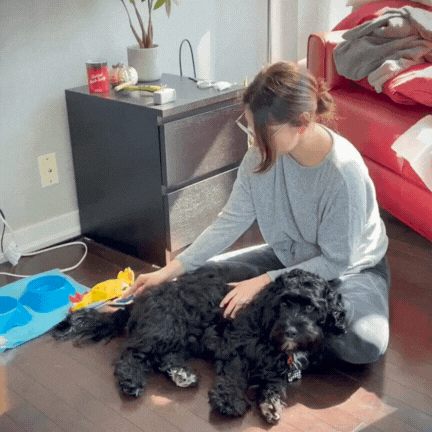
🦴Tip: Use a brush suitable for your dog's coat type, such as a slicker brush for long-haired dogs or a bristle brush for short-haired dogs. Use a soft brush or a rubber grooming tool over sore joints to avoid hurting them.
Bathing
Senior dogs may not need frequent baths unless they have a skin condition or get dirty. Use a gentle, moisturizing shampoo specifically formulated for dogs to avoid drying out their skin. Be sure to rinse thoroughly to remove all shampoo residue.
Read more: How to Bathe a Senior Dog: Tips for a Comfortable Experience
Skin and coat supplements
Adding supplements to your senior dog’s diet can help improve the health of their skin and coat. Omega-3 fatty acids, such as fish oil, are beneficial for skin and coat health. Consult with your veterinarian to determine the appropriate dosage for your dog.
Regular check-ups
Schedule regular veterinary check-ups for your senior dog to address any skin or coat issues. The vet can check for underlying health conditions that may affect the coat, such as allergies or hormonal imbalances.
Moisturize dry skin
If your senior dog has dry skin, you can apply a moisturizing lotion or coconut oil to soothe and hydrate the skin. Be sure to use products specifically formulated for dogs and avoid applying them to open wounds or irritated areas.
Maintain a healthy diet
A balanced and nutritious diet is essential for maintaining a healthy coat. Ensure your senior dog’s diet includes high-quality protein, vitamins, and minerals. If your dog has specific dietary needs, consult with your veterinarian for appropriate dietary recommendations.
Monitor for changes
Keep an eye out for any changes in your senior dog’s coat, such as hair loss, excessive shedding, or skin irritations. These may be signs of an underlying health issue that requires veterinary attention.
When should I visit the Vet?
We recommend visiting your vet if you notice any abnormal shedding symptoms such as bold spots, constant itching, bad smell, infected skin, and changes in behavior. As well, as if the hair loss comes accompanied by other symptoms like changes in appetite, weight, and mood.
Final Thoughts
There are several reasons that can be causing hair loss in your senior pup. Some shedding is normal and part of the hair cycle, however, if you notice unusual symptoms such as all that we have described in this article it is best to consult with your vet.
The most common causes of hair loss in senior dogs are hormonal diseases, allergies, skin infections, bad nutrition, or mobility issues that can result in pressure soreness. Fortunately, with the proper diagnosis, all of these conditions can be treated and your dog’s fur can grow back.
Sources
- WebMD: Bald Spots in Dogs. https://www.merckvetmanual.com/dog-owners/skin-disorders-of-dogs/hair-loss-alopecia-in-dogs
- Holly and Hugo Online Course: Care of the Senior Pet.
Related Articles
- Optimal Senior Dog Food: Nutrition for Healthy Aging
- 5 Best Dog Shampoos for Itchy Skin in 2023
- How to Bathe a Senior Dog: Tips for a Comfortable Experience
- Senior Dog 101: Our Curated Care Guide for Senior Dogs
Recent Posts
This summer, the temperatures are getting extremely high, and as you may know, dogs don’t sweat like humans to regulate their body temperatures. They mostly use their paws and breathing to cool...
Is the Dogo App Worth It? Honest Review After Training My Dog
Training your dog shouldn’t feel like another chore, but it often does because, unless you’re a professional trainer, you have to research everything yourself first. And that research can take...
